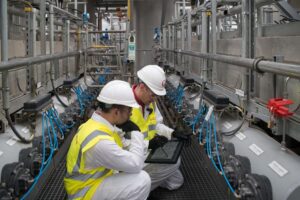Veolia is advancing its program to create a hydrogen gas-supply infrastructure and decarbonize the U.K. energy supply.
Believed to be the first application of its type in the U.K., the company’s latest development is now managing projects which incorporate electrolyzer technology to derive hydrogen from water, and powering these using the low carbon electricity from its Energy Recovery Facilities (ERF). Future use of the hydrogen could include both replacing the use of fossil fuel on the gas grid and alternative zero carbon vehicle fuel for commercial vehicles.

Veolia is accelerating its program to create hydrogen and cut carbon emissions (Source: Veolia)
For many years, methane gas has been used to heat homes and businesses, and used in power stations to generate electricity. As a result currently 85% of homes and 40% of the UK’s electricity rely on gas. But when methane burns it still releases carbon, which contributes to climate change.
Veolia’s projects will accelerate progress towards climate protection and a net zero future, by replacing fossil fuels and realizing the potential to decarbonize heat in industry, businesses and homes, and provide vehicle fuels. By using electrolysis, the process which uses electricity to split water into hydrogen and oxygen, it could create hydrogen that can be stored for future energy needs. This will cut carbon emissions, and is a potential future solution for decarbonization as water is the by-product when hydrogen is used. The gas industry is testing ways to use hydrogen in the gas grid, and Veolia is already preparing sites to be able to use this hydrogen in a range of on-site energy plants such as combined heat and power units, and industrial boiler plant.
Veolia currently operates ten plants that take around 2.3 million tonnes of non-recyclable waste and transform this into electricity for over 400,000 homes. This combined generating capacity of 180MWe takes pressure off the stretched UK electrical grid and effectively avoids using fossil fuels for generation.